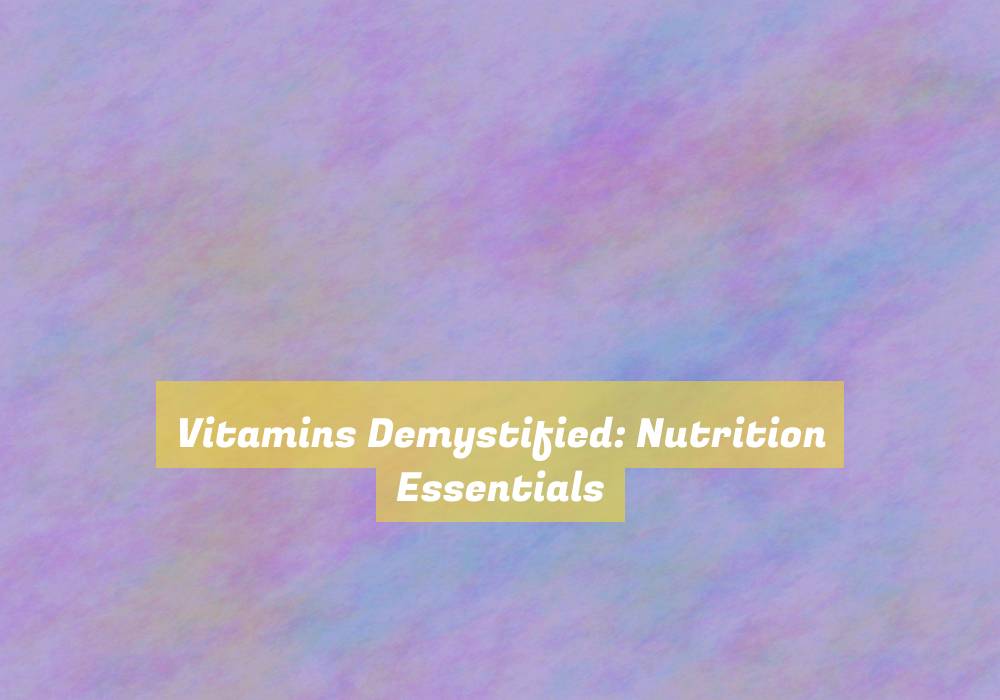Vitamins Demystified: Nutrition Essentials
You wake up to the soft glow of the morning sun streaming through your window, and as you stretch and prepare for the day ahead, you canG??t help but wonder if youG??re giving your body the essential vitamins it needs.
Understanding the role of vitamins in your overall health is crucial, and knowing where to find them in your diet can make all the difference. From boosting your immune system to supporting healthy skin and hair, vitamins play a vital role in your well-being.
But how do you ensure youG??re meeting your daily vitamin requirements in the best way possible? ThereG??s more to it than you might think, and weG??re here to unravel the mystery for you.
Understanding Vitamins and Their Functions
Understanding the essential functions of vitamins is crucial for maintaining overall health and well-being. Vitamins play a vital role in various bodily processes, such as metabolism, immune function, and cell repair. For instance, vitamin C is essential for collagen synthesis, which is crucial for skin health and wound healing. Vitamin D aids in calcium absorption, promoting strong bones and teeth. B vitamins are important for energy production and nerve function.
Each vitamin has its own specific function, and a deficiency in any of them can lead to health problems.
Vitamin A, for example, is essential for vision, immune function, and reproduction. It also supports the proper functioning of organs like the heart, lungs, and kidneys. Vitamin E acts as an antioxidant, protecting cells from damage and supporting immune function.
Understanding these functions helps you make informed decisions about your diet and ensure that youG??re meeting your bodyG??s nutritional needs. By incorporating a variety of vitamin-rich foods into your diet, you can support your overall health and well-being.
The Best Food Sources for Essential Nutrients
To obtain essential nutrients, focus on incorporating a variety of vitamin-rich foods into your diet. Start by including plenty of fruits and vegetables in your meals. Oranges, strawberries, bell peppers, and kale are excellent sources of vitamin C. Meanwhile, carrots, sweet potatoes, and spinach provide ample amounts of vitamin A.
Incorporating a range of colorful produce ensures that youG??re getting a diverse array of essential vitamins. Additionally, donG??t overlook the power of nuts and seeds. Almonds, sunflower seeds, and peanuts are packed with vitamin E, while chia seeds and flaxseeds are great sources of omega-3 fatty acids.
When it comes to vitamin D, fatty fish like salmon and mackerel are top choices. If youG??re a dairy lover, milk and yogurt are also rich in vitamin D. Lastly, for vitamin B12, consider incorporating more animal products such as eggs, chicken, and beef into your diet.
How Vitamins Impact Overall Health
Boost your overall health by understanding how vitamins directly impact your bodyG??s well-being and functioning.
Vitamins play a crucial role in maintaining your overall health. For instance, vitamin A supports your vision and immune system, while vitamin D is essential for bone health and immune function. B vitamins help convert food into energy and support brain function, and vitamin E acts as an antioxidant, protecting your cells from damage.
Vitamin C is vital for collagen production and immune function, and vitamin K is necessary for blood clotting and bone health. Without these essential vitamins, your body may struggle to perform these vital functions, leading to potential health issues.
Tips for Meeting Your Daily Vitamin Needs
Ensuring you meet your daily vitamin needs can be simple with a few key strategies for incorporating nutrient-rich foods into your daily diet.
First, aim to include a variety of fruits and vegetables in your meals. These colorful foods are packed with essential vitamins like A, C, and K, as well as important minerals.
Secondly, consider adding fortified foods to your diet. Many products such as milk, plant-based milk alternatives, and breakfast cereals are fortified with vitamins like D and B12.
Additionally, incorporating lean proteins such as fish, poultry, and legumes can provide you with a good dose of B vitamins and essential minerals like iron and zinc.
Lastly, donG??t forget about healthy fats. Foods like avocados, nuts, and seeds contain vitamin E, which is crucial for skin health and immune function.
Conclusion
Now that you understand the importance of vitamins and how they impact your overall health, make sure to incorporate a variety of nutrient-rich foods into your daily diet.
By focusing on a balanced and diverse eating plan, you can meet your daily vitamin needs and support your bodyG??s essential functions.
Remember, a healthy diet is key to maintaining optimal health and wellness.
